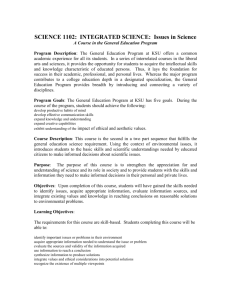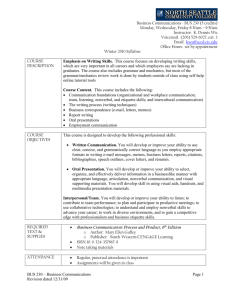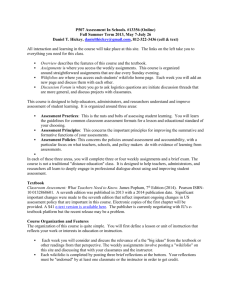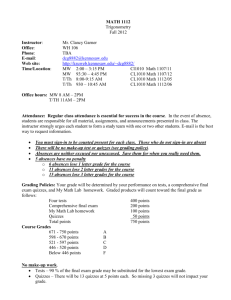STAT 8030: Programming in R
advertisement
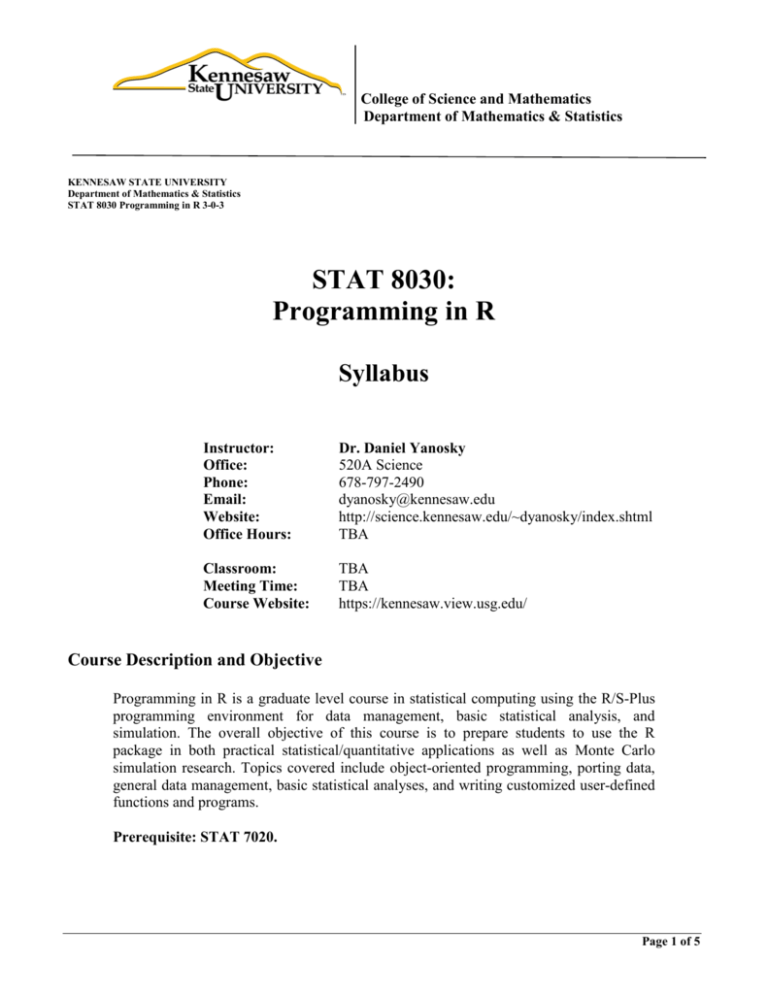
College of Science and Mathematics Department of Mathematics & Statistics KENNESAW STATE UNIVERSITY Department of Mathematics & Statistics STAT 8030 Programming in R 3-0-3 STAT 8030: Programming in R Syllabus Instructor: Office: Phone: Email: Website: Office Hours: Dr. Daniel Yanosky 520A Science 678-797-2490 dyanosky@kennesaw.edu http://science.kennesaw.edu/~dyanosky/index.shtml TBA Classroom: Meeting Time: Course Website: TBA TBA https://kennesaw.view.usg.edu/ Course Description and Objective Programming in R is a graduate level course in statistical computing using the R/S-Plus programming environment for data management, basic statistical analysis, and simulation. The overall objective of this course is to prepare students to use the R package in both practical statistical/quantitative applications as well as Monte Carlo simulation research. Topics covered include object-oriented programming, porting data, general data management, basic statistical analyses, and writing customized user-defined functions and programs. Prerequisite: STAT 7020. Page 1 of 5 Required Text Muenchen, R. A. (2009). R for SAS and SPSS Users. Springer Science + Business Media, LLC 2009. ISBN 978-0-387-09417-5. Secondary Texts* • Tufte, E.R. (1997). Visual and statistical thinking: Displays of evidence for making decisions. In A. Visual Explanations: Images and Quantities, Evidence and Narrative} (pp. 5-31). Cheshire, CT: Graphics Press. ISBN 0961392126. • Yanosky II, D. J. The KSU R Reference Manual: A Gentle Overview of R for Undergraduate & Graduate Students. Unpublished manuscript, Kennesaw State University, Kennesaw, GA. • Spector, P. (2008). Data Manipulation with R. Springer Science + Business Media, LLC 2008. • Fan, X., Felsovalyi, A., Sivo, S.A., & Keenan, S.C. (2001). SAS for Monte Carlo Studies: A Guide for Quantitative Researchers. Cary, NC: SAS Institute Inc. Learning Outcomes Upon successful completion of this course, students will be able to: • • • • • • • • • • Install and update R and associated add-on packages. Perform basic object-oriented computing using vectors, factors, matrices, data frames, and arrays. Import and export data into and from R using various data file protocols. Perform basic data management tasks including recoding variables, converting data types, merging data, etc. Perform intermediate computing tasks such as using conditional processing statements, loops, and writing one's own functions. Perform basic and advanced graphing of data. Use statistical distribution functions in R Perform basic statistical modeling of data. Generate pseudo-random data. Write customized simulation programs. Page 2 of 5 Grading Policy Each student's final course grade will be determined based on their performance using the following grading criteria: Class Component Percentage of Final Class Grade Weekly Notes Homework R Day Poster Presentation Final Exam Letter Grade 30% 20% 30% 20% A B C D F Percentile Grade 90-100% 80-89% 70-79% 60-69% Below 60% Required Readings & Weekly Note Assignments Weekly reading assignments are an integral component of this course. In order to encourage and assess the student’s interaction with the course text(s), weekly note assignments associated with each reading are assigned (see the course schedule at the end of this document). Therefore, 14-16 course notes assignments are scheduled for the semester. See the course document entitled “Weekly Course Notes Assignment Instructions” for detailed instructions and expectations. It is imperative that all note assignments are presented in YOUR OWN WORDS. Submitting material for course credit copied from any source is a violation of the Kennesaw State University Student Code of Conduct and may result in severe academic penalty up to and including expulsion. Finally, be mindful that your submitted coursework will be evaluated by automated and/or manual plagiarism detection. Also, be mindful that the instructor’s course notes will automatically be made available to students immediately after the deadline for the student’s weekly note assignment. The instructor’s course notes can be thought of as the solutions (or at the very least, a model) for these assignments. Therefore, due to the timing of these releases, late submissions of the weekly note assignment CANNOT be accepted. Homework Assignments Two (2) homework assignments are scheduled for the semester. Timely completion of these assignments is required. Homeworks must be submitted via the Turnitin system by 9:00AM on the due date specified in the course schedule (see the last section of the syllabus). Late homework assignments will be either penalized to an appropriate extent at the sole discretion of the instructor or simply not accepted for course credit. Page 3 of 5 Students are encouraged to work together in groups and discuss problems and their answers for homework assignments openly. Nonetheless, all work (e.g., notes, homeworks, projects, examinations, etc.) submitted to the instructor must be an authentic product of each individual student. In other words, if you collaborate with someone else on an assignment, it is best to work together at first, but then separate and write up your final product on your own. More specifically, any material submitted for course credit must be your own work. DO NOT copy material from texts, class notes, websites, other students, or any other source. You MUST put all material submitted in this class into YOUR OWN WORDS. Submitting material for course credit copied from any source is a violation of the Kennesaw State University Student Code of Conduct and may result in severe academic penalty up to and including expulsion. Finally, be mindful that your submitted coursework will be evaluated by automated and/or manual plagiarism detection. Evidence of plagiarism will be thoroughly investigated and may lead to informal and/or formal academic honesty charges and penalties. Please ask questions if this expectation is not clear. If evidence arises that a student has submitted someone else's work as their own, cheated on an assignment, or has committed some other academic violation of the University Code of Conduct, the instructor reserves the right to apply any academic penalty up to and including a failing grade (i.e., “F”') for the class. Furthermore, the instructor reserves the right to refer any incidence to the University Judiciary Program for formal documentation and/or charges. R Day Poster Presentation Every student is required either individually or as a team to present a presentation-quality poster at the 2013 KSU R Day event scheduled for the morning of Friday, November 8, 2013 from 7:45AM to 12:00PM in the KSU Student Center University Rooms A-E. Students are encouraged to work in groups of 2 or 3. Detailed instructions concerning this assignment are forthcoming. Examinations A final exam will be administered at the end of the semester. While students are encouraged to collaborate and work in groups for the homework assignments, students are NOT allowed to collaborate on the final examination. The end of course final exam will be a take-home, project-style assessment. The final exam is due to Turnitin on Monday, December 9, 2013 by 8:00pm. Withdrawal Students who find that they cannot continue in college for the entire semester after being enrolled, because of illness or any other reason, need to complete an online form. To completely or partially withdraw from classes at KSU, a student must withdraw online at www.kennesaw.edu, under Owl Express, Student Services. Page 4 of 5 The date the withdrawal is submitted online will be considered the official KSU withdrawal date which will be used in the calculation of any tuition refund or refund to Federal student aid and/or HOPE scholarship programs. It is advisable to print the final page of the withdrawal for your records. Withdrawals submitted online prior to midnight on the last day to withdraw without academic penalty will receive a “W” grade. Withdrawals after midnight will receive a “WF”. Failure to complete the online withdrawal process will produce no withdrawal from classes. Call the Registrar’s Office at 770-423-6200 during business hours if assistance is needed. Students may, by means of the same online withdrawal and with the approval of the university Dean, withdraw from individual courses while retaining other courses on their schedules. This option may be exercised up until October 11, 2013. This is the date to withdraw without academic penalty for Fall Term, 2013 classes. Failure to withdraw by the date above will mean that the student has elected to receive the final grade(s) earned in the course(s). The only exception to those withdrawal regulations will be for those instances that involve unusual and fully documented circumstances. Academic Integrity Every KSU student is responsible for upholding the provisions of the Statement of Student Rights and Responsibilities, as published in the Undergraduate and Graduate Catalogs. Section II of the Statement of Student Rights and Responsibilities addresses the University's policy on academic honesty, including provisions regarding plagiarism and cheating, unauthorized access to University materials, misrepresentation/falsification of University records or academic work, malicious removal, retention, or destruction of library materials, malicious/intentional misuse of computer facilities and/or services, and misuse of student identification cards. Incidents of alleged academic misconduct will be handled through the established procedures of the Department of Student Conduct and Academic Integrity (SCAI), which includes either an “informal” resolution by a faculty member, resulting in a grade adjustment, or a formal hearing procedure, which may subject a student to the Code of Conduct's minimal one semester suspension requirement. Final Notes This syllabus is subject to change at the sole discretion of the instructor. Any changes will be announced class-wide in a timely manner. Page 5 of 5

